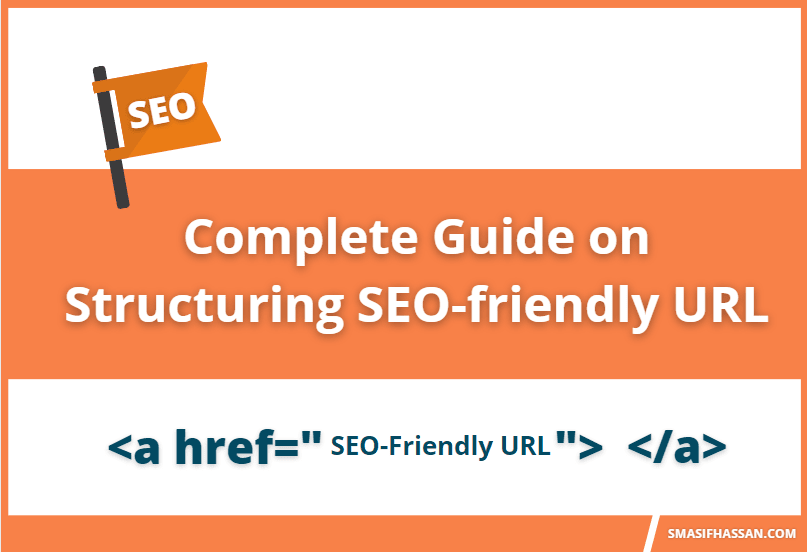You must have heard the proverb that “ First impression is the best impression ”. If you are an SEO then you have the opportunity to make the best impression by your URL. An optimized URL is often the first thing that creates a good shot for users and search engines. On the internet, you will find loads of confusing information on structuring proper URL
Honestly, it is a quite multi-dimensional concept, including various working parts.
Although It is not something that is the main purpose of your SEO efforts. However, it definitely helps you to stand out in the crowd of competitors. So, why not give a little extra but easy effort to sweep out some competition in search engine rankings.
To support you with your URL structuring we have compiled set guidelines. To get the help in your SEO journey, keep reading.
What is a URL
Uniform Resource Locator or URL, generally known as a “web address”. It will simply identify the location of your web page on the internet.
The URL also states the way to fetch that resource, commonly known as the “protocol”, such as FTP, HTTP, HTTPS, etc.
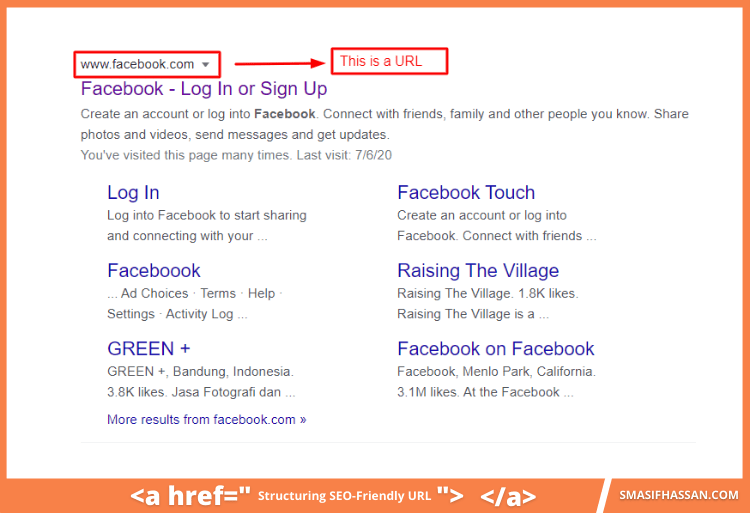
This is how the URL appears in Google SERPs. It gives an idea of what are the things that a visitor can expect on your web page. So before clicking not only your visitor but also the search engine knows about what is on your page.
Presenting a clear view and idea of your page is a brilliant idea. As it can make the visitor interested and rise your content reach.
Guidelines :
Let’s see the fundamental rules to structure URL. There are a lot of complicated ways but we will keep it easy for you. We compiled the guideline with the most important ones and the effective ones.
The Shorter The Better
Aim for the shorter link, it helps to increase both user readability and crawler readability.
So be wise while choosing words. Do not stuff a lot of keywords, or any useless word. Every space is important. So writing the same keywords in variations will just eat up your space and hurt your ranking.
Here is an example :
URL 1: http://www.gogirl.com/girls-customized-dress
URL 2:
Here the 1st URL is clear, clicking on this user will know that the page is for girls customized dress. The reader knows what to expect from this page.
But the 2nd one is full of unnecessary keywords and vague. In addition, it seems like an outdated website because of the longer form of URL. Most importantly user can not read the whole URL.
You should be confident enough that a user will remember your URL. And for that keep your link short and simple.
Use Hyphens
You can get confused between Underscore (_) and Hyphens (-) to use as a space in URL. Google expressed their view on this. According to google in case of SEO one should use hyphens as space on URL. Underscore are used to show continuity of a word.
Don’t Stuff URLs with keywords
There was a time when stuffing loads of keywords actually worked. But it was the time when people had no idea about keyword.
But over time search engines have upgraded their system. And now adding the same keyword repeatedly will not give you any SEO benefits. Moreover, it may even create various difficulty.
You might end up receiving a Google penalty if you use site-wide because google considers this as manipulated rankings. And it is against their terms and conditions.
Let’s see an example.
1.http://www.sturdy.com/buy-windproof-umbrella
2.http://www.rigid.com/best_umbrella-find_umbrella-online_umbrella-strong_umbrella-windproof.
The first URL clearly states it’s a web page regarding windproof umbrella.
But in the second one, they used the word umbrella repeatedly. It does not even give a clear picture of the webpage.
Do not use Dynamic Parameters
Generally, Dynamic parameters contain characters like =,+,%,&,? etc. Dynamic URLs are made of scripts. And do not follow the protocol of SEO. Most of the time they are too long and created with a lot of random letters, numbers, and characters or contain code like CID/UTF/ID? etc.
In case of database-driven website this is kind of unavoidable but try to rewrite your URL in static and readable text. So that it helps you to structure SEO-friendly URLs.
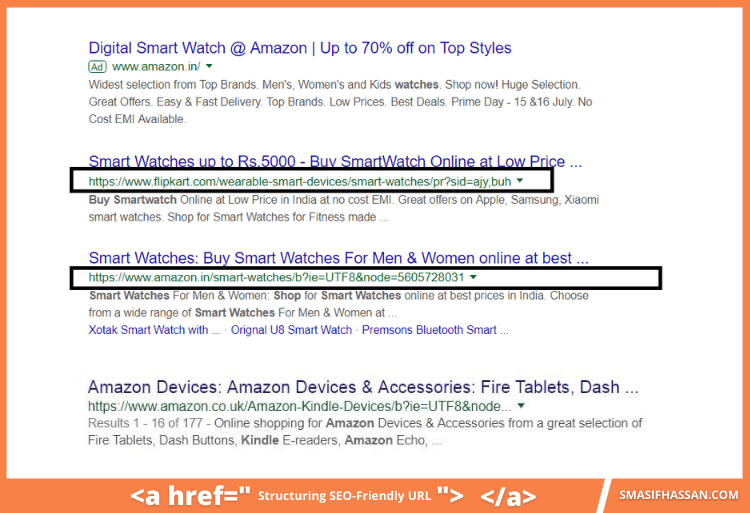
Here is an example of a Dynamic URL.
Because of their ambiguous structure, they are less likely to be shared. So without an extreme necessity avoid using Dynamic URLs.
Avoid keeping too many folders
In the SEO and the local SEO world, folder means Forward slash (/). It is highly recommended to keep as much as two folders on your website.
Let’s see why…
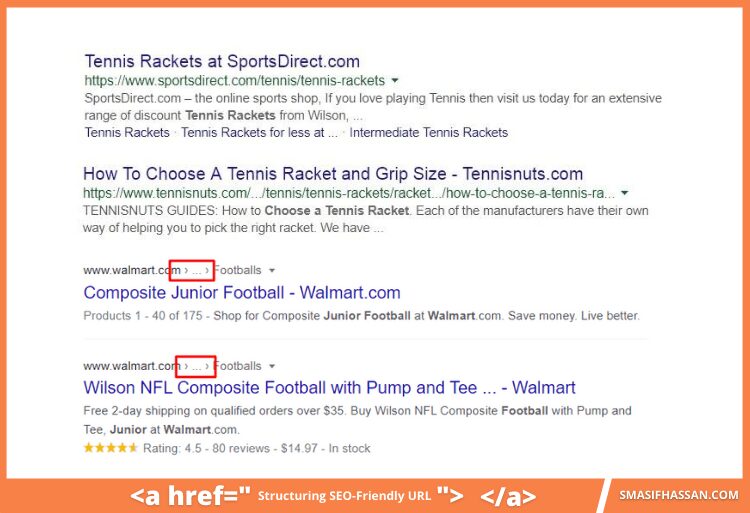
The first URL is short and simple, easy to read, and tells the user what they can expect (tennis rackets).
But The second one has at least five visible folders and without the title, one can not tell, whether they can find tennis rackets or just a guide to picking one. Moreover, the URL is cut off which will reduce a lot of click through.
So choose folders smartly. And keep your URL as short as possible.
Use Favicon
Favicon is a kind of icon. It appears on the web tab or on the bookmark.
It’s a tricky option as it directly will not give you any SEO benefit. But it is a small detail that presents social proof of your site. It pops out your web page among others. And make more prominent on search.
Example:
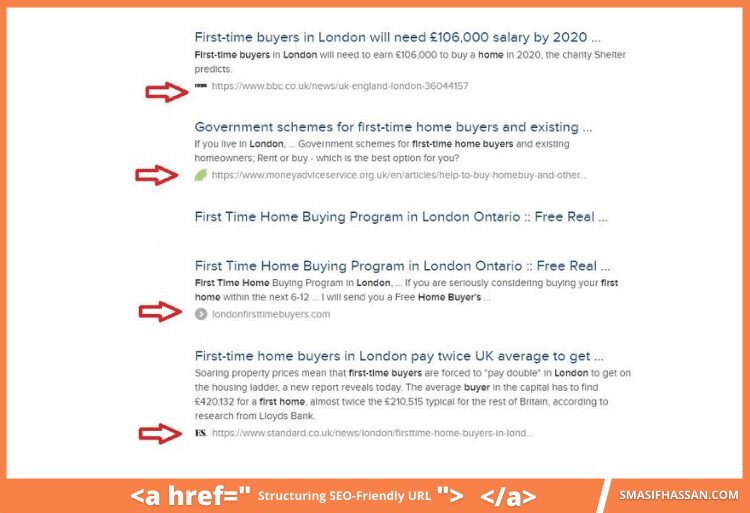
» Learn How Can You Add Favicons to Google Search Results.
A Bonus Tip:
HTTP vs. HTTPS
This is pretty simple and straightforward. And yes required to structure URL.
The “s” in HTTPS refers that it is secure. That means the communication between browser and that specific website is secured and encrypted.
Difference Between HTTP and HTTPS
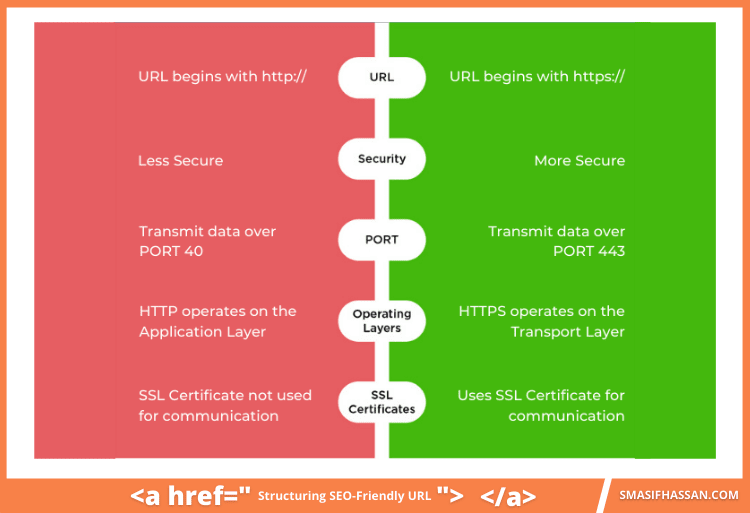
We would suggest adding https in your URL. As it is safer. It will help to secure your information from hackers.
Conclusion
If you are serious about SEO, it is a must to learn the basic fundamentals of structuring URL.
Let’s see the overview of this content again.
- Keep URL short and simple
- Use hyphens as space
- Refrain from stuffing keywords
- Use static URL
- Keep fewer folders
- Use Favicon
A few things to avoid:
- Stop words
- Parameters/Dynamic URLs
- Stuffed keywords
These create a negative impact on user experience and also devalues in case of search engine rankings.
You may find it a lot but these really worth your time. Structuring an optimized URL will keep you ahead of your competitors.
It is a game where every small detail counts. And this definitely going to help you in search engine rantings and ranking. So follow these rules and move toward an improved page rank.

